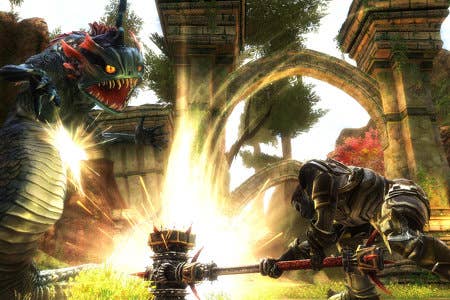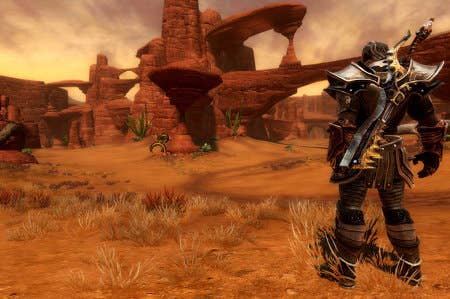38 Studios founder felt studio had a "sense of invulnerability"
Curt Schilling explains how 38 Studios went so horribly wrong
In an in-depth look at the demise of 38 Studios, founder Curt Schilling told Boston Magazine that he never expected the studio to implode like it did. The expose painted Schilling as supremely confident in the studio's prospects... right up until bankruptcy was filed. It was a risky venture for a new start-up to create an MMO, but Schilling told Boston Magazine that he believed in his vision from the beginning.
"If it wasn't an MMO, I wouldn't have done it," Schilling said. "If you look at the game space now, if you want to build something that's a billion-dollar company, the only game to do that with is an MMO."
"I never doubted I was going to do it. My whole life was spent doing things that people didn't believe were possible, because God blessed me with the ability to throw a baseball. And I carried that same mentality into everything I did here."
All told, Schilling lost around $50 million investing in the studio, beginning from an initial investment of $5 million. He expected Project Copernicus to be done by 2010, fours years after development started. Blizzard's World of Warcraft started development in 1999 and was released five years later.
"Curt sincerely believed that Copernicus was the best thing since sliced bread," said one former employee. Schilling "could not imagine a scenario where other people would not see the same potential he did. His attitude is always, This is gonna happen, the deal is going to close."
Schilling agreed with the employee's assessment.
"And that's the way I'm built. I think it's one of the reasons I was able to do what I did playing baseball. And it's not fake. I've been around situations where you can make people believe something they don't believe," he said.
"We never had that sense of urgency or panic," Schilling added. "I think there was a sense of invulnerability - I don't want to say invulnerability, but I think we were comfortable."

38 Studios' problems started in the investment phase, as Schilling had problems getting investors to agree with terms he had promised his employees. He told employees that they'd get a 50 percent share of all profits, leaving what was left to investors. That plan was later scrapped and replaced with standard stock options. Spark Capital partner Todd Dagres recalls meeting with Schilling about investing in 38 Studios, but he ultimately declined to invest in the company.
"Curt was not the CEO, but you could see he was quite involved and had a lot of control. I was a little nervous," Dagress said. "He was very forthcoming to tell you how much of his own money he put in. I assumed that they would look at it as, 'If he's this far in, it's not going to fail. He's not going to let this thing fail.'"
The development of the MMO, Project Copernicus, was plagued with management issues, some stemming from Schilling himself.
"His requests added significant work, and were often contrary to the direction given by other people," said one former employee.
"Once Curt turned on somebody, you went from being a superstar to he doesn't want to talk to you, overnight," added another.
Schilling admitted that there was "significant dysfunction" in his management team and development staff, but blamed many of those issues on himself.
"They didn't work well together," said Schilling. "I was amazed at the turf-building and protecting that went on."
"As the chairman and founder, who's above me?" he asked.
As delays mounted, Schilling even admitted that he felt the game wasn't coming together at all.
"The game wasn't fun," he said. "It was my biggest gripe for probably the past eight to twelve months."
As everything began to come apart, 38 Studios employees were hit hardest by the company's lack of payment. 38 Studios vice president of online services Bill Mrochek had harsh words for Schilling: the company's lack of payment meant employee healthcare had lapsed and Mrochek's wife needed a bone marrow transplant.
"Are you going to admit that your stupid hubris, pride, and arrogance would not allow you to accept that we failed - and help shut it down with dignity?" he asked Schilling. "You knew we had not been paying all the bills for months. You bet our lives on the roulette wheel of Rhode Island state politics."
Schilling denied that he was hiding the company's poor state.
"It wasn't that I didn't want to tell anyone," he said. "it's I didn't know what to say."
The studio's final days included Schilling reaching out to any who could save the company. According to Schilling, potential partners included an unnamed Chinese company, Nexon, and even Take-Two. Schilling said Take-Two was interested in publishing a sequel to Kingdoms of Amalur: Reckoning, but statements by Rhode Island governor Lincoln Chafee torpedoed the deal. Take-Two denies it.

"I am not aware that there were any negotiations. We do not comment on rumors and speculation," said Take-Two spokesman Alan Lewis.
Schilling's amazing confidence in himself and 38 Studios lasted right up until bankruptcy. He referred to a white-knight investor who would invest $15 million in the company, but the deal fell through due to state tax credits. "I believed with every ounce of my being that everything was going to work itself out," said Schilling. "I'm $50 million in at this point, so I'm not going to walk away.You could make an argument that that was blinding me, but there was the tenor and the velocity and the content of the conversations with the investors."
"I don't know any other way to be."
The full article by Boston Magazine can be found here.

